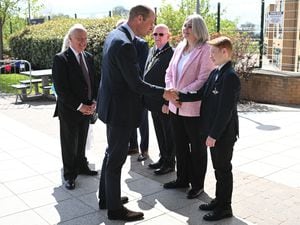Poll: Do you want Britain to remain part of the EU?
David Cameron has been given a fresh indication of the resistance he will encounter in his plan to renegotiate the UK's relationship with Brussels as a senior French minister warned against the creation of an "a la carte" European Union where members could pick and choose the aspects they liked.

The Prime Minister's proposals for reform will be considered by European leaders at a summit tomorrow and he has indicated he believes changes to the EU's fundamental treaties will be necessary to meet his demands.
But French economy minister Emmanuel Macron indicated his country would oppose any push for treaty change and suggested that Mr Cameron's desire to reform freedom of movement rules could be "a problem" because the principle is part of the "European DNA".
Mr Cameron will hold talks with German chancellor Angela Merkel before attending a state banquet with the Queen in Berlin later and is expected to have face-to-face meetings with other European counterparts before the Brussels summit begins tomorrow as he continues his drive to find allies in support of his reform agenda.
Mr Macron said: "I don't understand how it's possible to say 'we, the UK, want to have all the positive reasons to be part of the club of 28 and the European passport and a great financial place for all the EU members, if we don't want to share any risk with the other member states'. It doesn't fly. It's a common responsibility."
He told the BBC that any move towards treaty change would be rejected unless the people of Europe could be convinced of the need.
"If you speak about treaty change, the answer is no," he said. "It doesn't make sense. Whatever the treaty change will be, we need first to convey a positive image of Europe to reconcile people, otherwise, whatever the question will be, the answer of our people will be 'no', just because it's about Europe."
Mr Cameron wants to impose restrictions on the ability of EU migrants to claim benefits in the UK as part of his move to curb the number of people coming to the country, but Mr Macron warned against attempting to challenge the freedom of movement rules.
If the Prime Minister attempted to challenge that principle "that's a problem because it's part of the European DNA" but if Mr Cameron wanted "just to adapt the rules" the French would be prepared to discuss it.
"But I think we have to be extremely cautious not to create an EU a la carte, otherwise that's the starting point of dismantling a mansion," he added.
"Creating more flexibility and more simplicity for all member states is fine. But starting to create more simplicity for one member state is just a dismantling."
TUC general secretary Frances O'Grady urged Mr Cameron not to bargain away British workers' rights in his renegotiation.
In an open letter to the Prime Minister, Ms O'Grady said: "We believe that working people deserve some straight answers on the nature of the renegotiation.
"We respectfully request that you publicly confirm or deny that you are seeking to worsen existing rights and, at a time when casual employment such as zero-hours working is spreading across Europe, prevent the introduction of new ones that would protect workers against exploitation."
Ms O'Grady warned the PM: "Don't take working people for granted by demanding opt-outs from the workplace rights that Europe has delivered.
"British workers are already some of the least protected workers in Europe, well behind more successful economies like Austria, Germany and Sweden. But British workers do value the protections that they have. Our polling evidence shows that if you take rights away, working people are less likely to vote to stay in the EU."
A schedule for the two-day European Council summit released in Brussels made clear that the UK's demands for reform would not be discussed at either of the two planned working sessions, which will focus on migration, jobs, growth, competitiveness and security.
Instead, over dinner tomorrow, the EU's 28 national leaders will "have the opportunity to listen to Prime Minister Cameron in regard to the upcoming referendum in United Kingdom and the reforms he is seeking".
A senior British official at the European Commission, Jonathan Faull, has been appointed director-general of a new Brussels Task Force for Strategic Issues related to the UK Referendum, which will begin its work on September 1.
Budget commissioner Kristalina Georgieva said Mr Faull would "lead our work as issue after issue comes to our attention, in terms of what the expectations of the UK are for reforms of the European Union, what is possible (and) how we can meet each other".
She added: "Our relations with the UK as it prepares for a referendum are very important."
Mr Faull will report directly to the Commission president, Jean-Claude Juncker.





